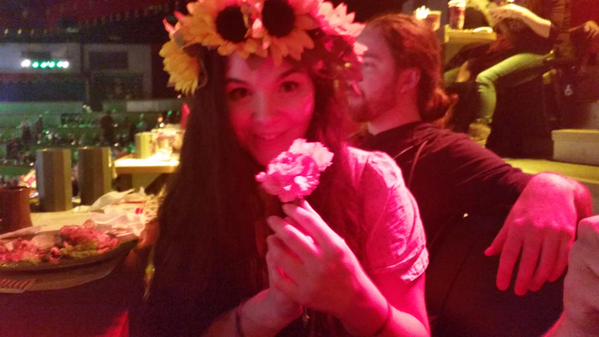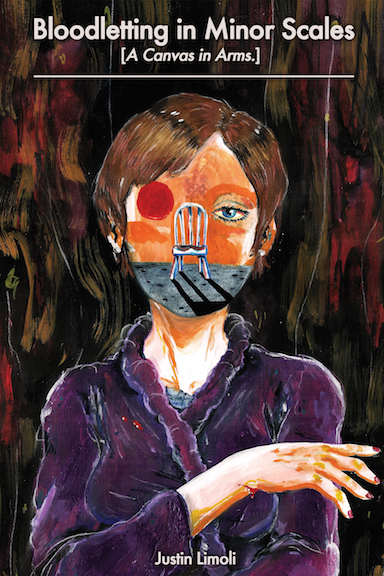Bloodletting in Minor Scales [A Canvas in Arms]
Justin Limoli
ISBN 978-0-9914183-1-2
Paperback, 75 pages
Plays Inverse 2014
$12.95
Review by m. forajter
Bloodletting in Minor Scales [A Canvas in Arms] is the debut verse play by poet-playwright Justin Limoli. Bloodletting follows the aftermath of a mother’s failed suicide attempt, detailing her son’s desperate attempt to make sense out of senseless grief. The play is a hybrid form, mixing the language of poetry and poetic forms like pantoums and sonnets with the traditional elements of a play.
In full disclosure, I went to school with Limoli at Columbia College Chicago. I didn’t know him very well, or talk to him often. He made me laugh in class. I knew he was writing a play. I never imagined that it would come together like this. I never imagined that a debut poetry collection could floor me. In light of this, it seems appropriate for this review to skew tradition. Poetry reviews generally read like literary analyses, looking at technique, action, language. But Bloodletting blurs boundary lines. A play in verse, a poem acting as a play: everything in Limoli’s world is incomprehensible as a definite, singular object. The format has to change. It must become an address.
Justin, I’m addressing this to you because I want this review to act as a command. I want everyone in the world to read your book. I want to make your book required reading for all the cowards in the world who call themselves poets & then hide behind flowers. You know these words are true because we are not friends. It has been so long since a book knocked me out.
It is the first page, & I am already crying.
This is the first line that plucks the stringed notes of my mother’s body.
This is the first line that calls her into being.
This is the first line that disassembles the inner verse of blood.
This line commits suicide, leaking into folded skin, becoming grief.
I wish I loved my mother as much as Limoli’s pantoums love his. I am afraid that in order to love someone this much they must kill you, & I am a coward. I am purposefully saying Limoli. It is too cheap to separate the speaker, and this book deserves more. Justin is Justin. Limoli is the poet & the speaker & also Justin. Life is stupid. Order is disorder. Write a pantoum, the dumbest of all poems, in response. Make the pantoum amazing. Bring them back in fashion. Wring it out. There can be no delineation. Delineation is a farce.
Justin: [Eyes holding back the image] My mother--
Blood: I am Blood, the
bleeding finite.
Justin: Is this the beginning?
Blood: [Plucks Justin’s left iris.] Yes, and all beginnings need victims.
Justin: My mother just cut---
Blood: Yes, I saw. Now the play can get started.
Justin: This is cruel.
Dear poets, how do you write a poem about suicide and not have it sound like trash? You too must be addressed because you make the rules. You set the table. Perhaps we must acknowledge that poetry is scum. Art is unethical. To scrounge pain for material is villainous. Justly, it is cruel to use tragedy for art. It must not be piteous, though. We must continue. We have to. There is no choice. Here is the first oxymoron.
Blood: You have a story to tell, so here are your stage and canvas.
[Lops an ear off Justin and coddles the earlobe with whispers.] Narrate.
I wish I were this honest. I wish I were this giving. I wish I was confused about poetry the way this book is confused about poetry. Is this book a play? Suddenly I have a mode for the surreal, and it is breaking my heart.
A dialogue is meant to conceive what I cannot
say. I cannot say (repeatedly) because I am
simply an experimentation of language.
[Unstitches mouth to prove it.]
Dear poets, dying is absurd. Living is impossible. How do you grieve, in the face of these facts? Grieving is stupid, and it makes you stupid by association. You are the dumb friend. You die by accident. You die on purpose, and then fuck it up and come back to life. Fuck your cutesy subconscious. These connections are absurd because they are real. Godot is a little bit early, and constantly checking for his cue. Justin is Clint Eastwood & Clint Eastwood’s chair. Justin can say knife in a poem without a problem. Bloodletting pulls poetic illusions about what makes a good poem off the shelf, fills it with water, and accidentally drops it on the floor.
[Justin plunges a fountain pen into Heart. Heart is now an inked setting with cursive.]
Heart: [To Justin] You clearly are not very good at conversing with hearts.
Molly Bloom: Why, is it hard?
Justin [Writes] I’m not very good with things buried in my chest.
Heart: Correct! As it should be, my sniveling lemon drop. This is
post-Shakespearean. The heart should not be spoken to directly.
When we blur these lines, when we make poetry less pure. When we make poetry less precious, we die, we submit, we say yes humanly.
This is what poetry is. Justin is better than you. Bloodletting does everything you are afraid to do. It kicks poetic convention to the curb because in the face of real suffering, none of our rules matter. Even the everyday shape of a poem cannot live up to pain. The poem repeats. The poem spills over. The poem becomes a play.
Make a note of this somewhere. Re-read Joyce.
Slipping implicates depth, and the gravity within your skin is related,
but what happened? Am I repeating myself, which I sometimes do,
lying to tell only myself, “She didn’t mean to, she didn’t mean to, etc.”
But she did, and I keep it, and it’s so sad that you lived.
As humans, we want to know the details of tragedy in order to better understand; to put disorder into order. But we know the natural state is entropy, so knowing becomes fear. We must know & not know simultaneously in order to divine understanding. How could one process a tragedy such as a mother almost-dying, except not to? This is the crux of the entire play, and Limoli’s words as a poet. Existence is liminal, cross-breeding. Mothers try to die and fail. The private is exposed on stage. Nobody is waiting for Godot.
Mom: Hello?
[Enter an impatient Godot.]
Godot: Hello?
Mental Ward: Not, not yet.
[Mental Ward chases Godot offstage.]
This book is everything I have been waiting for poetry to be: rich language, intense imagery, unabashed emotion, apologetic destruction, a s(p)lit & thus cohesive self, a dialogue on poetics, sneaky humor, living ghosts of our literary past, an honest poem.
Justin, I will never be the poet you are. I will never be the person you are. I am afraid. I am in awe. I am dying in the cheap seats in the back of the theater. Poets, read Bloodletting in Minor Scales [A Canvas in Arms]. This book is painful and so important. Everything is different now. We will never be the same.

m. forajter is a MFA graduate from Columbia College Chicago. Her work has been published in several magazines, including Columbia Poetry Review, Finery, Luna Luna, and Radioactive Moat. Her chapbook, WHITE DEER, is available from dancing girl press. She really likes Nirvana, werewolves, and medieval art.
